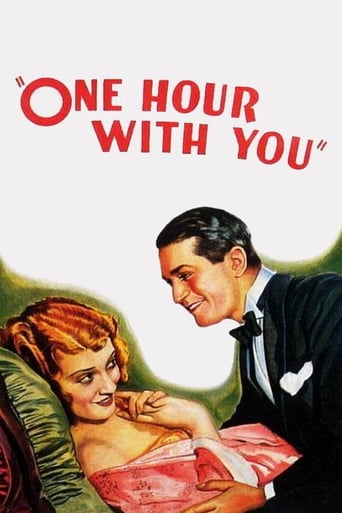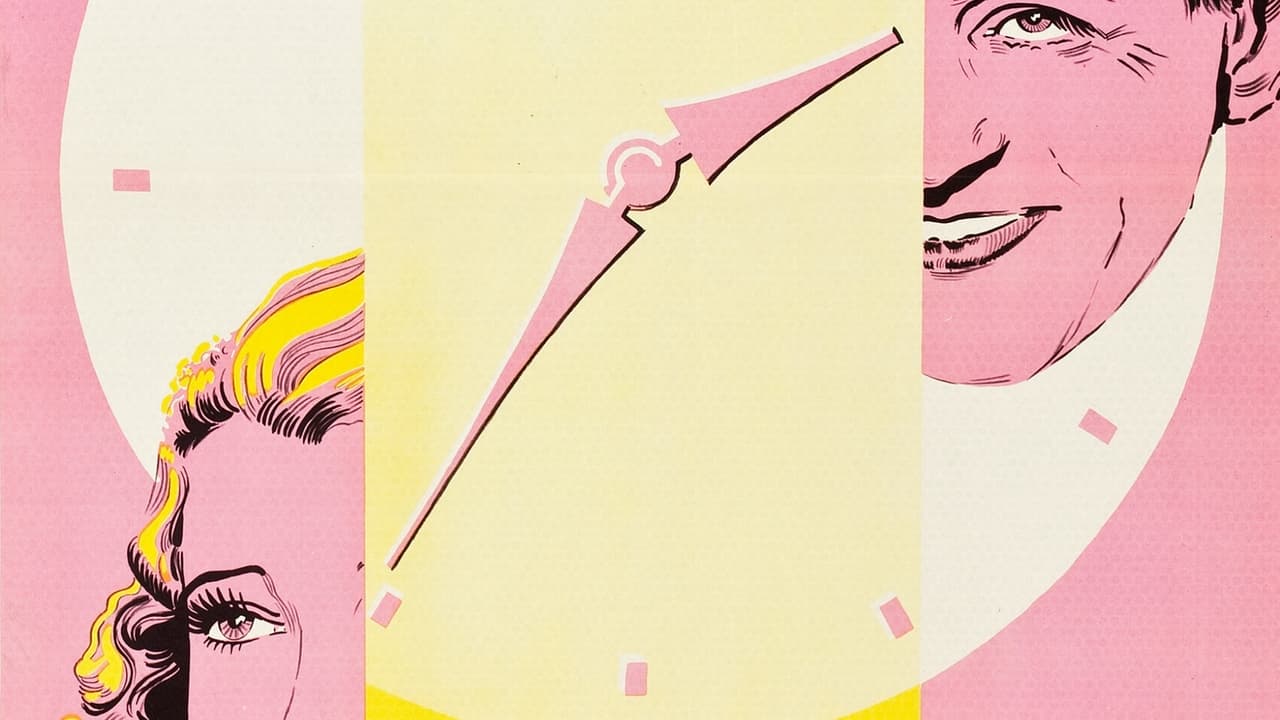Huineman
This classic comedy by acclaimed director Ernst Lubitsch (author of such films as "To Be or Not to Be" or "Ninotchka") displays brilliant humour, catching songs and incredibly modern points of view without ever leaving the vintage atmosphere of the time it was filmed.The issue of unfaithfulness is addressed in a way one would not suppose in a 1930's feature. Far from giving the viewer moral lessons, the movie leaves several doors open and even asks the public what would they do in a case like the one presented. The breaking of the fourth wall in doing so is another modern aspect that will take modern viewers by surprise (a very nice surprise, by the bye).No morals, no precepts, a lot of irony and sensibility; all disguised in evening dresses, bow ties, Art Deco, classic cars and that fantastic vaudeville style. Don't judge it by its age or fashion: many present films are not as modern as this is.
Neil Doyle
Ernst Lubitsch (with some "assist" from George Cukor) directs this charming and witty farce which gives Maurice Chevalier a chance to steal the film from his very talented co-stars, including Jeanette MacDonald and Genevieve Tobin.His rendering of "Oh, that Mitzi!" (he breaks the fourth wall to speak directly to the camera--as in "Gigi" years later), and "Three Times A Day" remain the highlights of the film. The story itself is pure fluff, a tale about a happily married couple who each have a fling but remain faithful to each other for the finale. Of course, it's all pre-code morality done with style and wit.The sprinkling of songs also includes some rhyming dialogue, always a clever mix of words and music. Jeanette's voice sounds tinny here and there's no use made of her operatic range as the songs are simple and sweet, but she's charming and appealing as Chevalier's happily married wife. It's hard to see why she couldn't suspect that her best friend Genevieve Tobin would want to seduce her husband when the woman is such an obvious flirt. But of course, the story is strictly fluff and full of many improbable moments. The rather abrupt ending seems an awkward way to resolve the whole marital situation.Worth viewing to watch Maurice Chevalier deliver one of his most satisfying performances, especially good when addressing the audience with his problems. The catchy title song by Richard Whiting gets some nice singing moments from several players.
Cyke
106: One Hour With You (1932) - released 3/23/1932, viewed 7/10/08.KEVIN: What? They're married?! And they're in love?! But the movie just started! Yes, Maurice Chevalier and Jeannette MacDonald reunite in Ernst Lubitsch's inevitable remake of his silent film The Marriage Circle, based on the play Only A Dream by Lothar Schmidt. Naturally, the best advantage of the switch from silent to talkie is getting to hear Chevalier's accent rattling off more of Lubitsch's impeccable dialogue. Obviously not content to make a normal sex comedy, Lubitsch throws in not only musical numbers, but also several dialogue scenes made of Moliere-esquire rhyming couplets. The two leads, Chevalier and MacDonald, absolutely devour their roles. They're sensational to watch, and I look forward to a few more team-ups from them in the future. Genevieve Tobin is very good as best friend and possible home-wrecker Mitzi, the loose trophy wife who makes things interesting for our happily married heroes. Roland Young is also fantastic as Mitzi's exasperated professor husband, who's just waiting for something to happen that will justify a divorce, showing it with a deadpan delivery of the funniest lines in the movie. ("When I married her, she was a brunette. Now you can't believe anything she says.") Not to mention Lubitsch regular Charles Ruggles as the wife's dweebish old flame who's still aching to get some quality time in with the wife.DOUG: This is Lubitsch's remake to Marriage Circle, his own earlier adaptation of Schmidt's Only A Dream. All the same players are in place: The happily married couple, the flirty best friend, her boring husband, and the wife's lusty ex. In order: Chevalier brings his usual manly Frenchy charm as Andre, and Jeanette MacDonald works her best comedy muscles as his lovely society wife Collette. Genevieve Tobin plays Mitzi, determined to get her claws into Andre no matter what it may do to him and his marriage to her best friend. Roland Young plays Mitzi's supremely uncool husband, apparently bored and repulsed by his wife's flirty antics. Charles Ruggles rounds out the cast as Collette's airheaded ex Adolph. In 99% of the movies made in this period, marriage is either something people try to get into or get out of, so what a surprise it is to start a film with the two leads not only already married, but very much in love. I like to pretend this movie is kind of an informal sequel to any of the other movies starring Chevalier and MacDonald. After the events of a movie like The Love Parade, or Love Me Tonight, or The Merry Widow, where they spend the whole movie courting each other, here we get to see them after they've settled down and are living together, still without losing their fantastic chemistry. So which version is better, silent or talkie? That's hard to say. Circle was such a wonderful discovery, a silent film where all the charming sexual shenanigans still hold up today. However, I'll go with this version, which has Chevalier and MacDonald, and a more experienced Lubitsch running the show (with an assist from an uncredited George Cukor), who adds in many songs and scenes spoken in rhyming couplets. (I thought the scene where Andre attempts to switch the placecards flowed more naturally in the original, though; here, it's a tad clunky). Last film: Shanghai Express (1932). Next film viewed: It Happened One Night (1934). Next film chronologically: Tarzan the Ape Man (1932).
theowinthrop
In the second of the four Chevalier - MacDonald films the leads are a married couple (Chevalier is a upper class doctor, of all things) who are happy together. In fact they are first seen preparing for their anniversary party. Both have friends who can spoil this. Chevalier's closest friend is Charlie Ruggles, who secretly loves MacDonald (but who is usually too nervous or intense to get anywhere with her - if she were interested). MacDonald is close to an old school friend, Genevieve Tobin, who is a continuous flirt (one can even consider her a nymphomaniac). She is married to Roland Young, but their marriage is on the rocks because of her affairs (his too - he wants to marry their maid). So MacDonald invites her friend into her home, and Tobin soon is being coquettish towards Chevalier. When she returns home, she asks him to see her on a professional (i.e. medical) problem, and proceeds to try to seduce him. This upsets Chevalier, who tries to remain faithful to MacDonald, but she (blind as she is to what Tobin is doing) insists he help her friend. Young is delighted. He is closing in on a divorce with Tobin. Finally, being weak, Chevalier gives in. MacDonald learns of this, and turns to Ruggles (!). And the film is set for some kind of resolution of these problems in sexual politics.The music is best recalled for the title tune, "One Hour With You". It would pop up for years in Paramount film musicals (in DUCK SOUP, it is played in the sequence when Harpo Marx is doing a "Paul Revere" ride to rally the countryside, only to stop at his girlfriend's for "one hour with her."). It also appeared as the national love song of Klopstokia in MILLION DOLLAR LEGS, with Jack Oakie singing the words, "Woof bootle gik..." instead of the original words to it. However, the number that gets me is the one mentioned in the "Summary" line, which Chevalier sings to explain to the audience his dilemma regarding his loyalties to his wife versus the fascination of the beguiling Tobin. In all of his films in the 1930s he would sing some tune that dealt with the heroine or another woman: "Mimi" in LOVE ME TONIGHT is an example, as is "Louise". "MITZI" is another example of this.The Lubitsch touch is shown throughout. One of the best moments is when Ruggles is talking to MacDonald about attending a party at their home, and learns it is a dinner party, not the costume party he is dressed for. He turns to his butler, and demands to know why he told Ruggles it was a costume party. "Oh sir," says the giggling butler, "I so wanted to see you in tights!" With bits like that sprinkled about, this film is a small treasure.


 AD
AD


